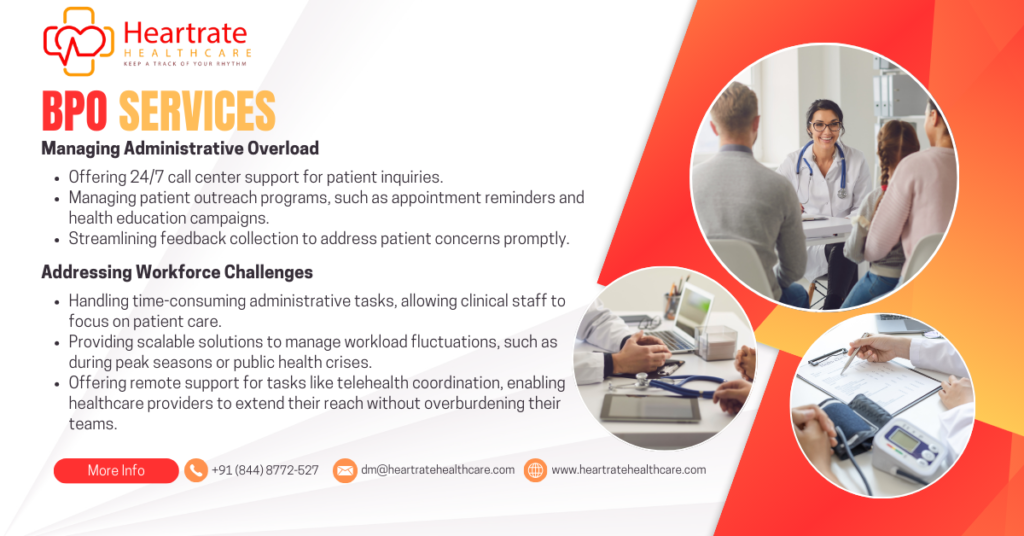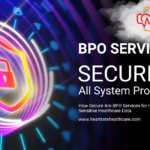Healthcare providers face immense pressure to deliver high-quality patient care while navigating complex administrative, financial, and operational hurdles. Business Process Outsourcing (BPO) services offer a solution to many of these challenges, enabling healthcare providers to focus on their core mission of improving patient outcomes. Let’s explore the key challenges that BPO services address and how they benefit healthcare organizations like Heartrate Healthcare.
1. Managing Administrative Overload
Healthcare providers often grapple with excessive administrative tasks, from patient scheduling to medical record management. These non-clinical duties consume valuable time and resources that could be better spent on patient care. BPO services streamline these processes by taking over administrative functions, such as:
-
Medical transcription: Ensuring accurate and timely documentation of patient interactions.
-
Claims processing: Reducing errors and delays in insurance claims.
-
Appointment scheduling: Improving patient access and reducing no-show rates.
By outsourcing these tasks, healthcare providers can achieve greater efficiency and free up internal staff for more critical roles.
2. Enhancing Revenue Cycle Management (RCM)
Revenue cycle management is a cornerstone of financial stability for healthcare providers, but it’s fraught with challenges like billing errors, claim denials, and delayed reimbursements. BPO services specialize in optimizing RCM through:
-
Coding accuracy: Ensuring compliance with ever-evolving medical coding standards.
-
Payment follow-ups: Streamlining communication with insurers to secure timely reimbursements.
-
Denial management: Identifying patterns and resolving issues that lead to claim denials.
By leveraging the expertise of BPO providers, healthcare organizations can reduce revenue leakage and improve financial performance.
3. Keeping Up with Regulatory Compliance
The healthcare industry is heavily regulated, with providers required to adhere to stringent laws like the Health Insurance Portability and Accountability Act (HIPAA). Non-compliance can lead to hefty fines and reputational damage. BPO services help healthcare organizations stay compliant by:
-
Implementing robust data security measures to protect patient information.
-
Keeping up-to-date with changes in regulatory requirements.
-
Conducting regular audits to ensure adherence to legal standards.
With BPO’s support, healthcare providers can navigate the complexities of compliance without compromising operational efficiency.
4. Improving Patient Engagement
Patient engagement is crucial for improving health outcomes, but maintaining effective communication with patients can be challenging. BPO services enhance patient engagement by:
-
Offering 24/7 call center support for patient inquiries.
-
Managing patient outreach programs, such as appointment reminders and health education campaigns.
-
Streamlining feedback collection to address patient concerns promptly.
These services ensure that patients feel heard and supported, fostering loyalty and trust in healthcare providers.
5. Addressing Workforce Challenges
Staff shortages and burnout are prevalent issues in the healthcare sector. Overworked staff can lead to reduced productivity and lower-quality patient care. BPO services alleviate these workforce challenges by:
-
Handling time-consuming administrative tasks, allowing clinical staff to focus on patient care.
-
Providing scalable solutions to manage workload fluctuations, such as during peak seasons or public health crises.
-
Offering remote support for tasks like telehealth coordination, enabling healthcare providers to extend their reach without overburdening their teams.
By partnering with BPO providers, healthcare organizations can achieve a healthier work-life balance for their staff and maintain high standards of care.
6. Leveraging Advanced Technology
Healthcare providers often face barriers to adopting advanced technologies due to budget constraints or lack of expertise. BPO providers bridge this gap by offering access to state-of-the-art tools and platforms, including:
-
Automation: Streamlining repetitive tasks like data entry and billing through robotic process automation (RPA).
-
Analytics: Providing insights into operational performance and patient trends.
-
Interoperability solutions: Ensuring seamless integration between various healthcare systems.
These technological advancements enable healthcare providers to stay competitive and deliver better patient care.
Conclusion
BPO services address critical challenges for healthcare providers, from managing administrative workloads to enhancing financial performance and patient engagement. By partnering with a trusted BPO provider like Heartrate Healthcare, organizations can unlock efficiencies, maintain compliance, and focus on delivering exceptional care. As the healthcare landscape continues to evolve, leveraging BPO services will be essential for providers aiming to thrive in a competitive and demanding environment.
#HealthcareBPO #PatientCare #Efficiency #HealthcareSolutions #DataManagement #Compliance






